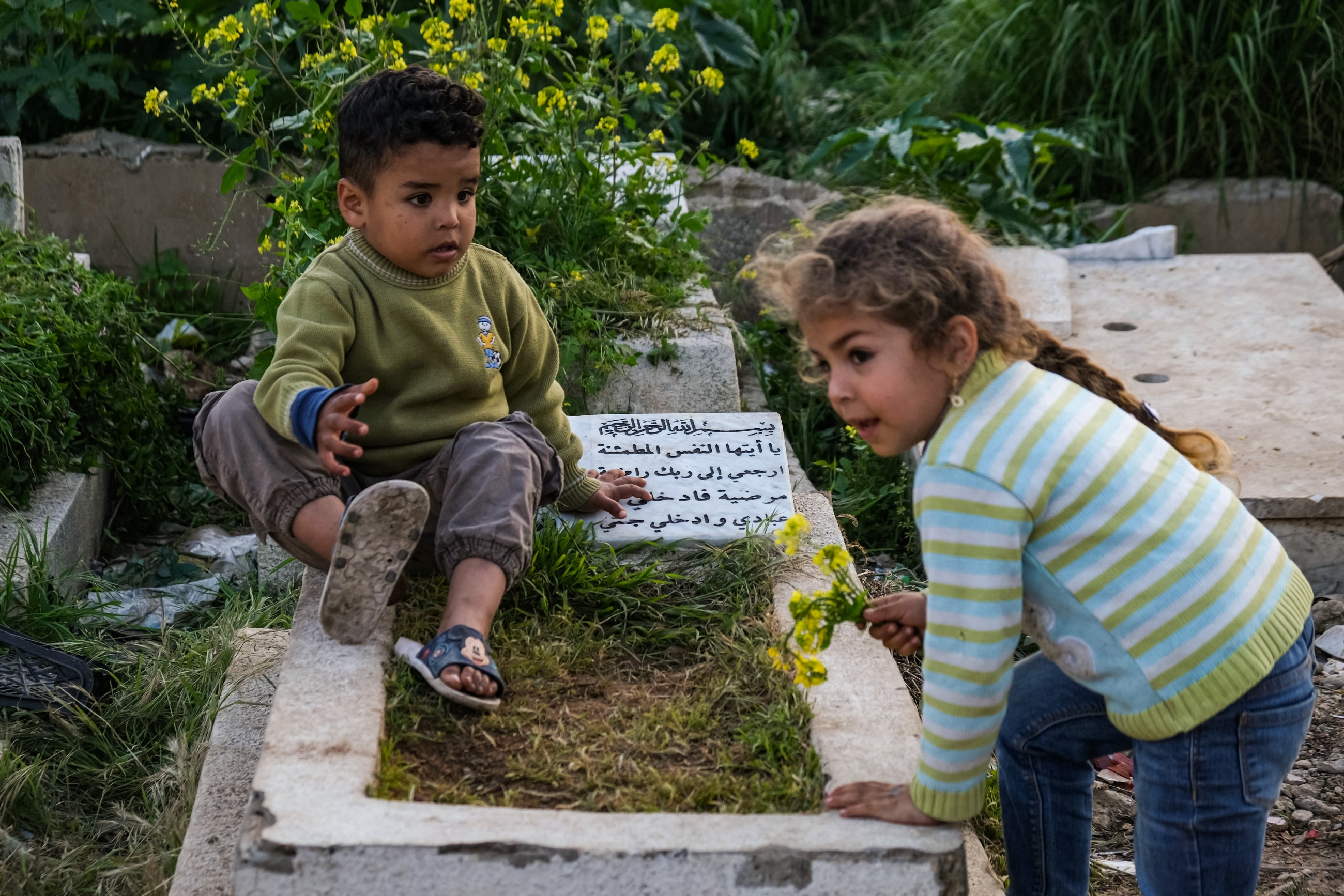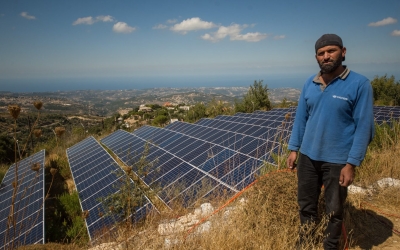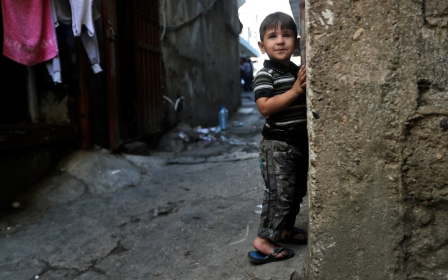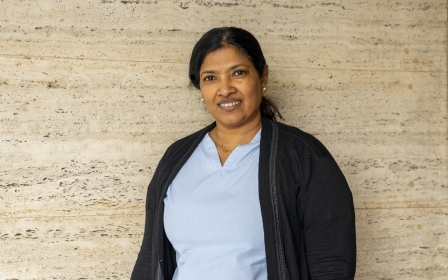Lebanon: New mothers pay with their lives as crisis hits maternity services

Despite the financial turmoil engulfing Lebanon, Amany and Alaa Daher were eagerly anticipating the birth of their third child. She was to be a baby sister for their two toddlers, a welcome arrival in a world beset by economic hardship.
What Alaa, 39, did not imagine, is that he would be coming home from hospital with his newborn child but without his wife.
Amany had contracted Covid-19 eight months into her pregnancy. Her breathing suffered, and she was told to isolate at home. In the run-up to the birth, check-ups with doctors were cancelled.
“She started having a severe cough and shortness of breath, after which she felt she immediately needed to go to the hospital,” Alaa, Amany’s husband, who has recently relocated to the UAE with his two older children, told Middle East Eye.
“So, I took her to the hospital, where the doctors decided to deliver the baby to release the pressure it might have been exerting on Amany’s lungs,” he said slowly, his voice shaking.
Amany and Alaa’s baby was delivered by emergency Caesarean section. But as their daughter took her first breath, Amany breathed her last. Safely swaddled in a blanket, baby Nada was handed to her helpless father.
Sharp rise in maternal mortality rate
Despite the steady arrival of Syrian refugees in Lebanon over the last decade, the country was among just a few in the Middle East to make significant progress on ensuring the safety of women giving birth, bringing about a 75 percent reduction in the annual maternal mortality rate.
'This happened against the backdrop of the economic issues and low vaccination rates among pregnant women'
- Faysal El-Kak, National Committee on Safe Motherhood
But the last three years have seen a reversal of this progress, with cases like Amany’s becoming more and more common again.
According to Unicef, the UN’s children’s aid organisation, the annual number of women dying from complications related to pregnancy or childbirth in Lebanon has risen nearly threefold in the last three years.
“Numbers rose again between 2019 and 2021, from 13.7 to 37 deaths per 100,000 live births,” the agency reported in a survey released last Wednesday.
Moreover, both mothers and children are increasingly suffering from malnutrition and food insecurity.
This sharp surge reflects how the pandemic, coupled with the country’s deep financial tailspin, has hammered at women and children’s health.
The pandemic effect
Lebanon’s economic crisis has seen the local currency lose over 90 percent of its value in the last three years, prompting doctors and nurses to leave the country in droves and culminating in shortages of drugs and medication across distributors and pharmacies.
Meanwhile, the Covid-19 pandemic, which hit the Middle Eastern country in late February 2020, exacerbated Lebanon’s plight and overwhelmed its fragile healthcare system.
“During the pandemic’s stage four peak, we were hit by the Delta variant, which is more severe in pregnant women, who, if they contract the virus, are at a higher risk of serious complications and death,” said Faysal El-Kak, coordinator of Lebanon's National Committee on Safe Motherhood.
“All of this happened against the backdrop of the economic issues and low vaccination rates among pregnant women.”
Khalida Bitar, a doctor who works in obstetrics and gynaecology, pointed out that a lot of pregnant women had to self-quarantine due to the pandemic, which led to a reduction in the number of doctor follow-ups, a factor that has affected expectant mothers’ wellbeing.
Plagued by shortages and high prices
The currency crash severely impacted most of the population’s purchasing power and saw medical bills skyrocket, interrupting Afaf Khodor’s routine prenatal visits at the American Univerity of Beirut Medical Center, one of Lebanon’s best-known private hospitals.
The hospital told Khodor they now charged around $2,000 for a normal delivery and $2,500 for a C-section, nearly 54 million Lebanese pounds and 67 million pounds at the black market exchange rate. The official minimum wage in Lebanon remains 675,000 Lebanese pounds per month, or about $25.
'Some of the medications and vitamins I had to take were very expensive. At the start of my pregnancy, I was struggling to even find some of them'
- Ataf Khodor, new mother
Khodor, a 25-year-old new mother who had spent two years trying to conceive and who had previously had a miscarriage, eventually found a cheaper clinic.
“It was still too expensive, but we managed,” Khodor, whose husband is the family’s only breadwinner, said, laughing.
“Some of the medications and vitamins I had to take were very expensive. At the start of my pregnancy, I was struggling to even find some of them at the pharmacies,” she said.
“I ended up asking family members and friends to purchase them for me from abroad - Saudi Arabia and Germany. I also took half-empty pillboxes from women who were done taking the medicine and had extra left.”
According to the Unicef report, soaring inflation and a crippling financial collapse have marred the ability to deliver the most basic healthcare, as the sector faces recruitment freezes and cutbacks on imports of pharmaceuticals and medical equipment - with 58 percent of hospitals limited by drug shortages and 39 percent hit by medical tools insufficiency.
El-Kak, who is also the director of the Women’s Integrated Sexual Health programme, said that there is a dearth of medical supplies and vaccines - the flu vaccine for pregnant women, for instance, was not available for some time.
He pointed out, however, that the inaccessibility of these vaccines does not necessarily contribute to maternal deaths but affects pregnant women's healthcare in general.
Children’s health at risk
Khodor’s baby daughter Ayana arrived in good health and is now one month old. On a good day, her parents scour pharmacies to find her infant formula milk.
On a bad day, they admit the baby to the hospital to treat her stomach acid reflux and pay a bill that amounts to almost half the family’s income, factoring out the cost of the medication.
“It is a big sum!” Khodor said.
'Would I conceive another baby during these circumstances? Of course not'
- Afaf Khodor, new mother
A third of children in Lebanon do not now have access to healthcare, while as of October 2021, 53 percent of children had to skip a meal, Unicef said. The situation may deteriorate further as a result of the war in Ukraine, which used to provide Lebanon with more than 80 percent of its wheat imports.
Meanwhile, the number of infants who die within the first four weeks after delivery “increased dramatically among refugees in four provinces assessed, from 65 neonatal deaths in the first quarter of 2020 to 137 in the third quarter”.
Childhood vaccination rates in Lebanon, which was once one of the top-performing countries in the healthcare sector, have critically slumped, putting hundreds of thousands of children in peril of preventable diseases such as measles and pneumonia.
“Repeatedly, anguished parents and families are unable to access basic healthcare for their children - as many dedicated health workers struggle to keep operations running during the crisis,” said Ettie Higgins, Unicef Lebanon representative.
Medical personnel, aghast at the conditions or desperate for higher pay, are a growing part of the Lebanese exodus. Some 40 percent of doctors – including those whose job is centred around women and children’s health issues – have left the country, as well as some 30 percent of midwives, according to Unicef’s data.
But Bitar and El-Kak have thus far decided to stay behind and work.
“I would say the number of births decreased by more than two-thirds, and I’m not basing this claim on numbers from my clinic only... this number is representative of all the different hospitals I work at in Beirut,” Bitar said.
Many women, especially those from the middle class, are opting against having children, a widespread decision that is leading to a rollback in birth rates in Lebanon, Bitar indicated.
“Would I conceive another baby during these circumstances? Of course not,” said Khodor, who spends most of her time taking care of her firstborn and had to leave Ayana with her in-laws to sit in for this interview.
“Not out of ego or anything, but, to be honest, the circumstances slashed our ability to provide our children with just the minimum human rights.”
New life
As for Alaa, he is looking for a new and better life in the UAE, having moved there at the beginning of 2021 after his wife Amany died.
Baby Nada was left behind in Lebanon to be looked after by Alaa’s mother and nursed by his brother’s wife - taking care of all three children alone was too much for Alaa.
While Amany’s absence shook the family to its core, they have - in time - been able to turn over a new leaf abroad. Alaa works in the information technology business and his financial situation has improved.
Every once in a while, Alaa takes his two children back to Lebanon, where they check on baby Nada and visit Amany’s grave.
Middle East Eye delivers independent and unrivalled coverage and analysis of the Middle East, North Africa and beyond. To learn more about republishing this content and the associated fees, please fill out this form. More about MEE can be found here.





